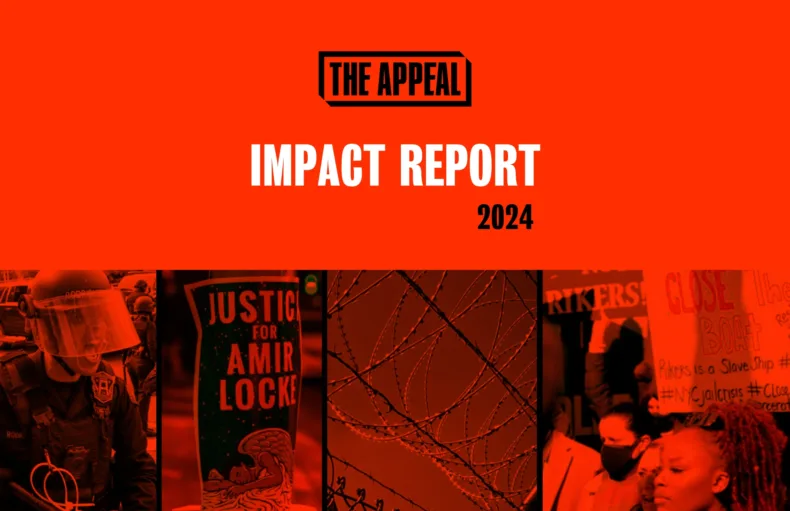Newsletter
The Appeal’s Most Impactful Reporting in 2024
From changing policy to helping people get a shot at freedom, we’re proud of the vital work we published in 2024.

This week, The Appeal launched its third annual Impact Report, which offers a small window into the many ways our journalism made a difference in 2024. Our stories have contributed to policy changes, spurred state and federal investigations, and helped people access care, representation, and freedom.
In 2024, we published more than 150 newsletter issues and articles. Thanks to you—our loyal newsletter readers—we uplifted the stories of more impacted people than ever. This year, currently or formerly incarcerated people wrote more than 40 percent of our newsletters.
Our stories also changed the criminal legal system:
- A court gave three young people a chance for post-conviction relief after we investigated the Phoenix Police Department’s killing of 19-year-old Jacob Harris. Even though police killed Harris, prosecutors charged his three friends—including two teenagers—with his murder. The judge granted their requests because of “extraordinary circumstances” now surrounding their cases. After our reporting, Arizona lawmakers introduced two bills to try to repeal the “felony murder” law that allowed law enforcement to charge the so-called “Phoenix Three.”
- The Federal Communications Commission (FCC) ended exorbitant phone call prices for incarcerated people. New FCC rules cut costs by more than 50 percent. Calls are now capped at 6 cents per minute in prisons and large jails. The FCC—which also ended kickbacks to agencies—cited our reports examining problematic telecom contracts with jails and sheriffs.
- Illinois residents successfully pressured leaders to drop “Street Cop” police training. Residents said they learned about the controversial program—which encourages violence and racism— from our reporting. After local citizens discovered the Burr Ridge Police Department’s upcoming training, the police chief canceled the event.
- An Atlanta pre-arrest diversion program was able to continue operating. After we reported that a secret bidding process excluded the popular, current provider—the Policing Alternatives & Diversion Initiative (PAD)—the process was canceled. The Atlanta City Council approved PAD’s new contract.
This year, we also published Locked In, Priced Out, the first national database of prison commissary prices. Since then, organizations and scholars have used our work to research prison conditions and possible reforms. One advocacy group is now pushing for lower commissary prices. We also inspired a formerly incarcerated reader to collect local jail commissary lists. Just this week, a currently imprisoned reader wrote about our project and the costs inside his prison.
As we wind down the year, we’re thankful to our readers for making this work possible. Every story you read, every issue you share, and every dollar you donate helps make these impacts possible. Thank you for helping us expose the harms of the criminal legal system and elevate solutions that keep all people safe.
We’re closing for winter break this week, so we’ll be back in your inboxes in January.
Wishing you safe and joyful holidays.

ICYMI—From The Appeal
Twice the number of people died at the Atlanta area’s scandal-plagued Clayton County Jail in 2024 compared to the previous year.
The head of Virginia’s Department of Corrections dismissed complaints about inhumane conditions at Red Onion State Prison—and instead told lawmakers that prisoners who intentionally burned themselves had misbehaved and were manipulative.
Public records reveal how the Washington Department of Corrections uses a nebulous victim rights policy to bar incarcerated people from participating in public debates.
Illinois Governor JB Pritzker tried to use the state’s parole board to safely free more people from prison. But after Republican backlash, the board’s work has essentially been frozen.
The City of Atlanta may have violated its own ordinance in its apparent attempts to undermine a pre-arrest diversion program’s pending contract with the city.
In The News
President Biden commuted the sentences of about 1,500 people who were released to house arrest during the COVID-19 pandemic. Experts said he could still do a lot more. [Tamara Keith and Deepa Shivaram / NPR] From The Appeal: Numerous groups are calling on Biden to commute federal prisoners’ death sentences.
Those released included former Pennsylvania “Kids for Cash” Judge Michael Conahan, who received kickbacks for locking up children in a for-profit detention facility. One child died by suicide. [Chris Palmer, Fallon Roth, and Ryan W. Briggs / The Philadelphia Inquirer]
The Maricopa County Sheriff’s Office and the Phoenix Police Department did not discipline any officers for leaving a handcuffed man to die in a jail cell. The man’s family obtained a $4.8 million legal settlement. [Dave Biscobing / ABC15]
South Carolina lawmakers reintroduced the South Carolina Prenatal Equal Protection Act, which could expose people who have abortions to the death penalty. [Chris Walker / Truthout]
An anonymous, 25-year-old Texan behind the Twitter account ThuggerDaily explained how he chronicled the YSL RICO case, the longest trial in Georgia history. [Charles Bethea / The New Yorker] From The Appeal: The charges against Young Thug, Gunna, and YSL were over-broad, overstated, and unnecessarily harsh.
A YSL defendant filed a class-action lawsuit after he was stabbed multiple times inside Atlanta’s infamous Fulton County Jail. [Joe Henke and Dajhea Jones / 11Alive] From The Appeal: In November, the DOJ released a damning report on the facility’s conditions.
